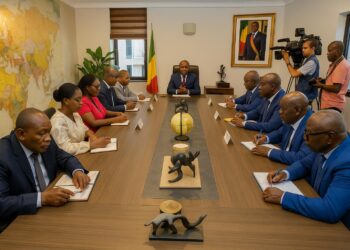Launch of national SME policy process
With a ceremonial stroke at Brazzaville’s Chamber of Commerce, Minister for Small and Medium-Sized Enterprises and Handicrafts Jacqueline Lydia Mikolo inaugurated an ambitious national exercise: drafting Congo-Brazzaville’s first integrated policy framework for SMEs and artisans, a sector supplying an estimated 90 percent of non-oil employment in the republic.
Officials describe the process, supported by the United Nations Economic Commission for Africa and the African Development Bank, as a blueprint for inclusive growth, designed to calibrate regulation, finance and technology so that Congolese micro-enterprises can translate resilience shown during the pandemic into sustained, formal productivity.
Government vision for SMEs
Speaking to reporters, Minister Mikolo emphasised that the forthcoming policy will articulate « clear, actionable and measurable roadmaps » aligned with President Denis Sassou Nguesso’s vision of transforming the private sector into a second engine of national income beside hydrocarbons, while preserving social cohesion and environmental stewardship.
The ministry foresees a three-tier governance structure: a high-level steering committee chaired by the Prime Minister, technical clusters integrating public agencies with chambers of commerce, and a monitoring unit mandated to publish annual scorecards, a level of transparency welcomed by domestic business associations.
Financing the promise
Access to capital remains a critical bottleneck; World Bank data place Congo’s domestic credit to the private sector at barely 6 percent of GDP, far below the Sub-Saharan mean of 30 percent. The forthcoming policy proposes partial-risk guarantees and a sovereign window within the national development bank.
Several lenders, including the Banque Postale du Congo and two regional microfinance networks, have already signalled willingness to collaborate, according to the ministry communiqué. Officials emphasise that concessional lines will prioritise women-led ventures and green technologies, echoing AfDB’s Affirmative Finance Action for Women in Africa programme.
Digital leap and skills
Digitalisation occupies a central chapter of the draft. The plan envisages an e-registry simplifying business creation to under 48 hours, interoperable with the tax authority’s portal, and a national artisan marketplace leveraging Congo-Brazzaville’s 30 percent mobile-money penetration, figures cited by GSMA Intelligence.
Training modules, co-designed with Marien Ngouabi University and Expertise France, will cover bookkeeping, coding and export logistics. « Skills are the currency of competitiveness, » says economist Jean-Bruno Malanda, noting that only 14 percent of entrepreneurs use cloud tools, citing a 2022 UNCTAD survey.
Local value addition
Another strategic pillar aims to raise locally manufactured inputs in public procurement from 10 to 25 percent by 2027. Authorities will refine standards, extend tax holidays for machinery and coordinate quality labs so SMEs can join agro-processing and light construction supply chains.
Regional lessons
Policy drafters analysed Kenya’s 2005 MSME Act and Mauritius’s Development Bank toolkit, identifying best practices such as cluster-based incubation and export insurance. Yet they are careful to tailor measures to Congo’s geography of rivers and forests, where logistics costs can reach 45 percent of product value, consultants estimate.
Institutional coordination
The forthcoming policy will sit alongside the National Development Plan 2022-2026 and the African Continental Free Trade Area strategy adopted last year. Harmonising incentives between ministries of finance, digital economy and environment appears vital to avoid what analysts from the Brookings Africa Growth Initiative term « fragmented pragmatism ».
Private sector perspective
For Aimé-Mathias Seck, president of the Congolese Employers Federation, the consultation process itself marks progress. He tells this review that earlier decrees « often arrived as a surprise; now we are at the table discussing timelines, customs reform and even insolvency law, which is a first ».
Women’s cooperative leader Yolande Ibata echoes the sentiment, but insists on swift implementation: « Rural artisans cannot wait another decade; a mobile laboratory for product certification would open Cameroonian and Gabonese markets instantly. » Her plea underscores the cross-border focus embedded in Central African Economic and Monetary Community treaties.
Measuring progress
The ministry plans to use a composite SME Health Index, tracking formalisation rates, exports, job creation and digital uptake. Quarterly dashboards will be published on an open portal, an approach consistent with recommendations from Transparency International that data disclosure itself can reduce informal fees and boost investor confidence.
International support
UNDP’s country office has committed technical advisors, while the European Union is considering a 12-million-euro envelope for seed-capital matching, diplomats confirm. Such external backing balances Congo’s fiscal consolidation objectives under its IMF programme, which encourages public-private partnerships rather than direct subsidies for enterprise development.
Risks and outlook
Observers caution that reforms could stumble on electricity supply, cited by Afreximbank as the third-highest operating cost for Congolese manufacturers. The policy therefore proposes mini-grids in industrial parks and tax credits for solar adoption, aligning with Brazzaville’s nationally determined contributions under the Paris Agreement.
If executed, analysts from Control Risks forecast that SMEs could add 1.5 percentage points to annual GDP growth within five years, easing dependence on oil royalties. Such potential explains the urgency now embodied in Minister Mikolo’s initiative, which, for many entrepreneurs, represents a long-awaited turning point.










































